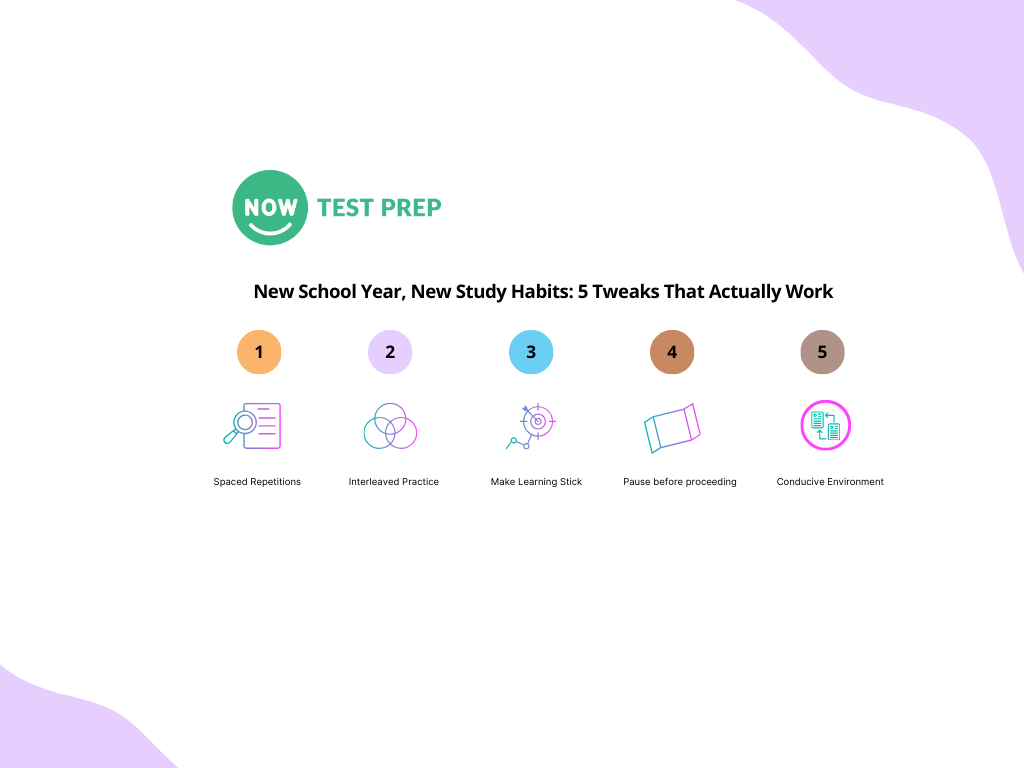From “I Can’t” to “I Got This”: How to Reframe Your Child’s Mindset During Test Season
Let’s be honest—test season can stir up a lot of emotions. For students, it’s stress, self-doubt, and pressure to be perfect. For parents, it’s the frustration of watching your child work hard but still say things like, “I’ll never get this” or “I’m just not a math person.” - We hear that all the time. And we get it.
The good news? There’s a simple but powerful shift that can help your child build confidence, bounce back from mistakes, and approach test prep with a calmer, clearer mindset. It’s called a growth mindset—and it can change everything.
What Science Says: Growth Mindset Builds Resilience
The idea behind growth mindset is simple: instead of believing that intelligence is fixed, students begin to understand that their abilities can grow with effort, strategy, and time.
This isn’t just a feel-good theory. According to research from Frontiers in Psychology, students who adopt a growth mindset tend to show higher resilience, stronger well-being, and greater engagement in school. They’re better equipped to handle setbacks—and more likely to stick with tough material when it matters most.
And the best part? These mindset shifts don’t just help with school—they show up in every part of your child’s life.
“I Can’t” Is Just the Beginning
When a student says “I can’t do this,” we teach them to add a simple word that changes everything:
“I can’t… yet.”
That tiny shift moves their thinking from self-doubt to self-growth. Instead of shutting down, they start asking, What can I try next?
It’s a mindset that fosters persistence, problem-solving, and confidence in their own progress—not perfection.
Mistakes = Growth
One of the most common barriers we see during test prep? Fear of failure.
But here’s the truth: the best learning often happens right after a mistake. Every time a student gets something wrong, their brain has an opportunity to build new pathways, rewire, and retain the correct information better the next time.
As Dr. Carol Dweck and her team at Stanford discovered, the key difference between high-resilience and low-resilience students isn’t ability—it’s how they respond to setbacks. Growth-minded students aren’t afraid of getting it wrong. They see it as part of the process.
Why This Mindset Helps with Test Anxiety
Test anxiety is real. But a growth mindset can help reduce that pressure by shifting the focus away from “getting everything right” and toward learning how to improve.
In other words, your child doesn’t need to be perfect—they just need to keep showing up.
When they know that effort, not innate talent, is the path to progress, the stakes feel lower. That confidence leads to calmer, more focused test prep—and better results.
What Parents Can Do to Support a Growth Mindset
You don’t need to be a psychologist to help. These small shifts at home can make a big difference:
➤ Reframe setbacks
When your child says something like, “I’m just bad at reading” or “I’ll never get this,” it’s tempting to jump in with reassurance—“Yes you can!” or “Don’t say that!”
But here’s a better approach: acknowledge the frustration, then gently shift the perspective.
Try saying: “Reading might feel tough right now—but that just means we haven’t found the right strategy yet. Let’s figure out what’s getting in the way and work from there.”
Action Steps for Parents:
- Start with empathy. Say: “That sounds frustrating. I get it.” Let your child feel heard before moving to encouragement.
- Shift the language. Use phrases like “You’re not there yet” or “This is something we can work on together.”
- Get curious, not critical. Ask: “What part feels confusing?” or “Where do you usually get stuck?” This helps them think more specifically about their challenges.
➤ Celebrate effort and strategy
It’s easy to fall into the habit of saying things like “You’re so smart!”—especially when your child gets a good grade or solves a tough problem. But while that kind of praise feels good in the moment, it actually sends the message that their value comes from being naturally good at something.
Instead, the most powerful praise is the kind that focuses on what they did to grow: their effort, strategy, persistence, and problem-solving.
Try saying: “You really stuck with that even when it got tricky—I love how you didn’t give up.” or “That new approach you tried totally paid off!”
Action Steps for Parents:
- Praise the process. Look for moments when your child changes strategy, asks for help, or shows persistence—and name it out loud.
- Be specific. Instead of general praise, highlight what they did: “You didn’t let that mistake stop you.” or “You noticed the pattern and used it to solve the next one.”
- Encourage trying over winning. If they took a risk or tried a new method—even if it didn’t work—celebrate that courage.
➤ Share your own learning struggles
Sometimes the most reassuring thing a child can hear is: “Me too.”
When your child is frustrated or feeling stuck, it can help to share a time you struggled with something—whether it was math in school, learning to drive, or even managing work deadlines. The goal isn’t to lecture, but to remind them that growth is a lifelong process, and even adults hit roadblocks.
Try saying: “When I was your age, I used to freeze up during tests too. I remember how it felt—but I learned a few tricks that helped me get through it.”
Action Steps for Parents:
- Focus on the process, not the result. Talk about what helped you improve—practice, asking for help, changing your mindset.
- Be honest, not heroic. The more authentic the story, the more they’ll relate. You’re not telling them you mastered everything—you’re telling them you kept going.
- Invite conversation. Ask: “Has that ever happened to you?” or “What’s something that’s felt hard lately?”
➤ Normalize mistakes
No one likes getting things wrong—especially students who are used to doing well. But mistakes aren’t the enemy. In fact, they’re one of the most powerful tools for learning.
When your child messes up on a test, forgets a step in math, or blanks on a vocab word, it’s easy for them to feel defeated. That’s where you come in.
Try saying: “Great—now we know what to focus on next. This mistake is actually helpful.” or “Making mistakes is how your brain figures out what to work on.”
Action Steps for Parents:
- React calmly to errors. Whether it’s a low score or a missed answer, avoid showing frustration. Respond with curiosity: “What do you think tripped you up?”
- Look at mistakes together. Review missed problems not to point out what went wrong—but to explore why and how to adjust next time.
- Celebrate the discovery. When they figure out a mistake on their own, give them credit for catching it. That’s growth in action.
➤ Focus on progress, not perfection
In a world of perfect scores and pressure-filled benchmarks, it’s easy for students to feel like anything less than an “A” isn’t good enough. But here’s the truth: real growth isn’t about being flawless—it’s about getting better, little by little. As a parent, one of the most powerful things you can do is help your child track and celebrate their progress, not just the final outcome.
Try saying: “You got two more questions right than last time—look at that improvement!” or “Last month, this type of question used to trip you up. Today, you nailed it.”
Action Steps for Parents:
- Compare them to themselves, not others. Reinforce that their goal isn’t to match someone else—it’s to be a stronger version of their own past effort.
- Highlight effort patterns. Point out moments where they pushed through distractions, showed discipline, or solved something they once avoided.
- Celebrate consistency. Progress doesn’t always mean huge leaps. Even small, steady steps are worth acknowledging.
Final Thoughts: Growth Takes Practice
Just like test prep, building a growth mindset takes practice. Your child may not believe in themselves yet—but with the right tools, support, and encouragement, they will.
At Now Test Prep, we help students strengthen more than just scores—we help them strengthen the belief that they can grow through effort, strategy, and support. We’ve seen students go from defeated and discouraged to confident and empowered—all by learning how to reframe their thinking.
Our reputation is built on word-of-mouth referrals and happy repeat customers.
We have never received a review with fewer than 5/5 stars.
Thank you to our amazing students and families!


